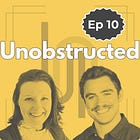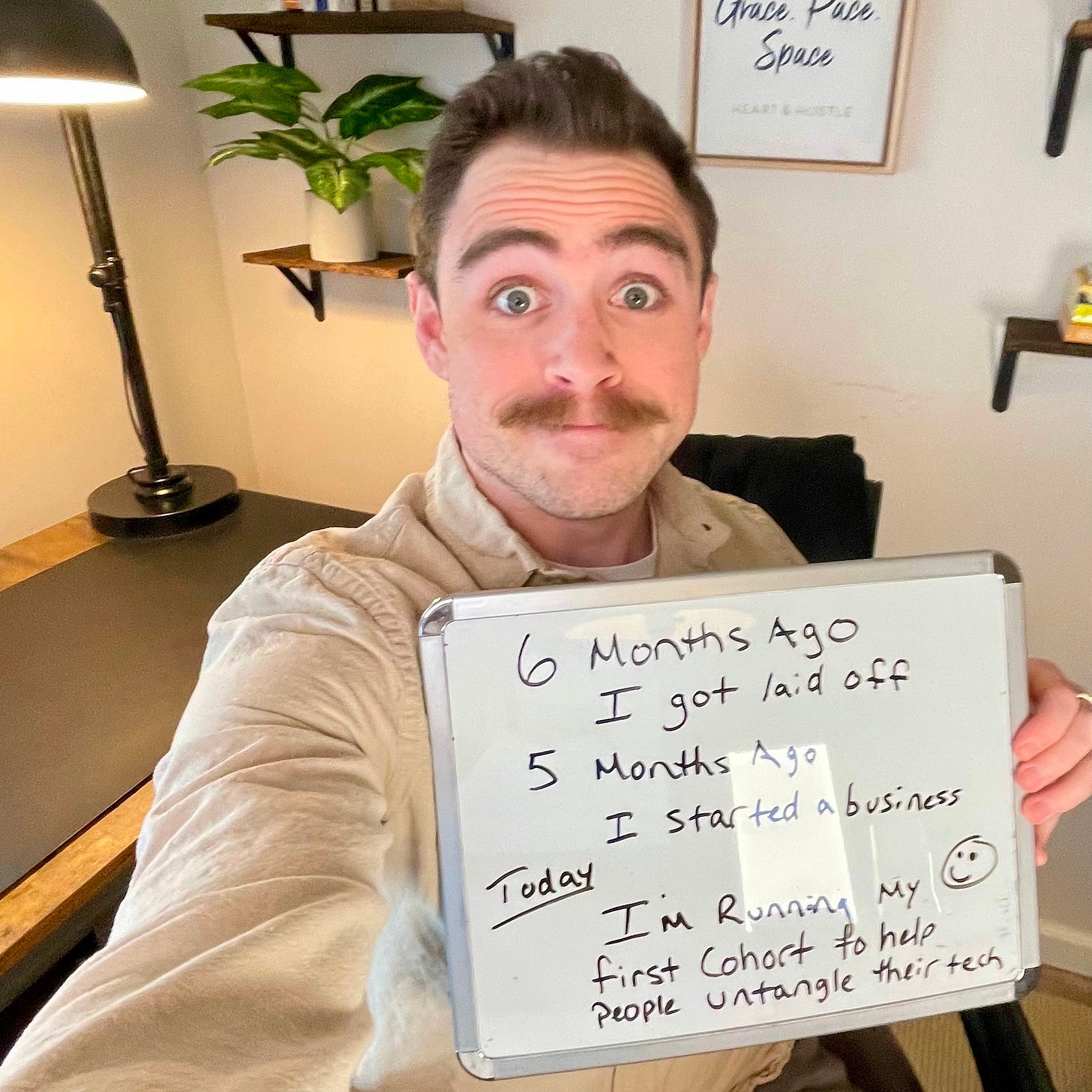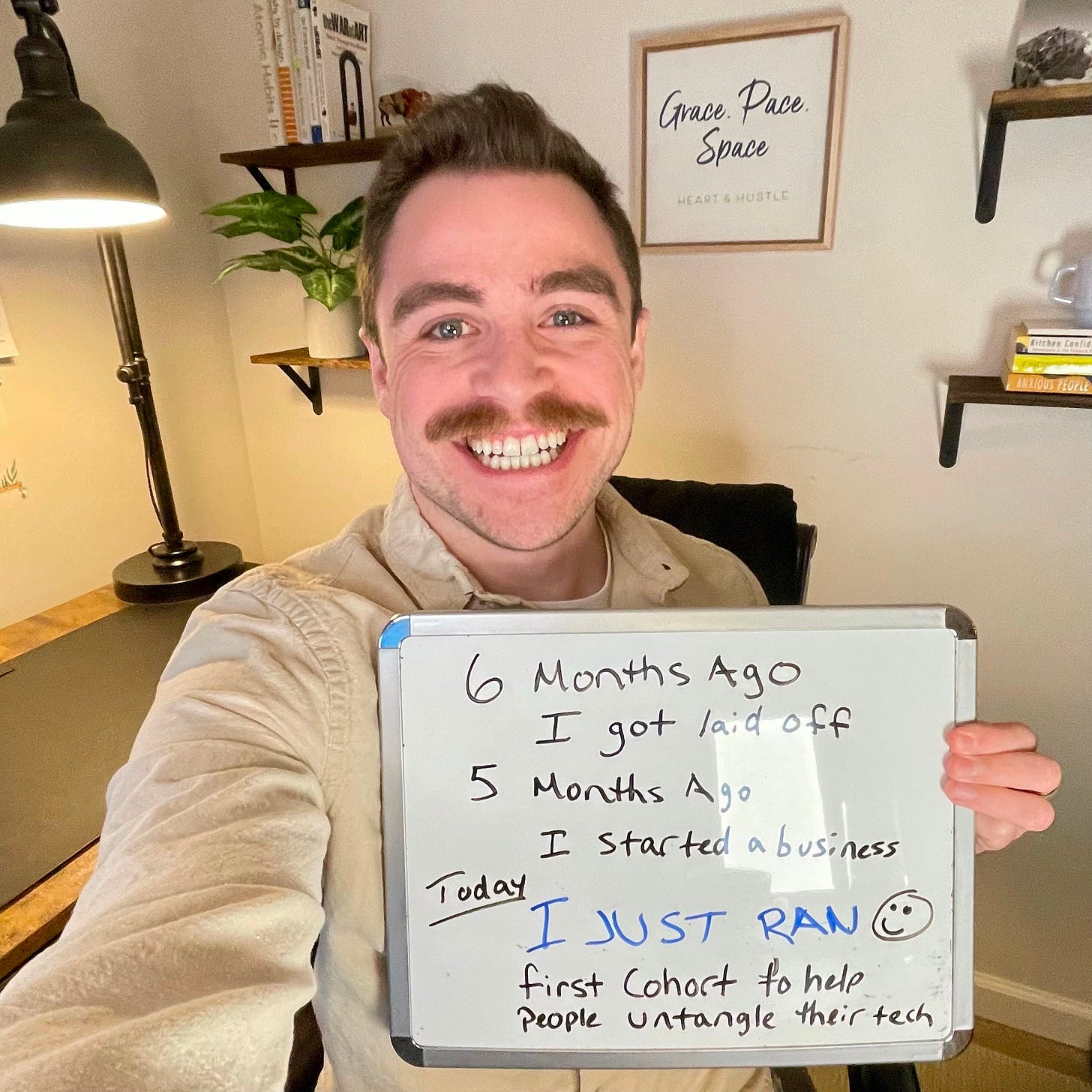If what they said didn’t match how it made you feel when they said it…
Go with your gut.
That’s a tough lesson to learn. But once it clicks, you can’t undo it. And quietly questioning their intent without vocalizing it is a conflict avoidance game you won’t want to play anymore.
Because you learned that trying to please everyone is the fastest way to please no one. And disappointing yourself in the process.
It really is a lose—lose.
Even though it came from a place of wanting to connect by helping.
Hey. hi. hello.
Welcome back or welcome to Unobstructed.
People-pleasing is an earnest effort to give. But there’s a sneaky little catch. And while you’re not going to like it, the people pleasers are going to really hate it.
Alright…deep breath, here we go:
People pleasing is so selfish.
Like, really really very incredibly selfish.
Hi I’m Derek, and I’m a recovering people pleaser.
While I’m at it, I’d like to point out that I didn’t say whether being selfish was good or bad, but you already formed an opinion anyway.
Cool, just saying.
No, no…that’s fine—everyone sees this differently. And it has everything to do with what they were taught. Why is it selfish? Great question.
It’s pretty simple actually: people pleasers want to give because they want to get acceptance in return.
To be validated, welcomed. It’s a learned behavior built on the idea that disagreement, conflict, or failing to deliver on a request are ways of losing favor with someone. Disappointing them. And in that exchange, the dynamic says that your worth is tied to what you can do—not to who you are.
The unfortunate and hard truth is that we all see acceptance as safety. So we make decisions we believe will earn us acceptance.
For some, that’s acceptance from themselves, to themselves.
For many, that’s acceptance from others, to themselves.
Your weekly spotlight.
I was a camp counselor back in the day.
But it was a question I picked up from my time guiding outdoor trips that changed my professional and personal life forever.
"what's helpful to you from me—listening or offering my thoughts?"
Sometimes people just want to be heard.
And that’s why this conversation between Adam Grant and Dr. Caroline Fleck on the Re:Thinking podcast snagged my full attention.
“People don’t need you to agree with them—they just need to feel like you understand.”
-Adam Grant
Validation is an important tool for leaders to be aware of. Because it communicates acceptance and belonging. Dr. Caroline Fleck outlined an enormous distinction between validation, acceptance, and agreement that I’d never quite realized, even though I’d used pieces of it in practice for years.
Validation is presence. Not praise.
Validation = mindfulness, understanding, empathy.
Validation ≠ praise, approval, or agreement.
So good, right?
I mean…WHAT?! c’mon…
People pleasers, why don’t y’all take a quick breath (I will too).
Because here’s what nobody tells you when you start managing people, leading teams, or…just…trying to be a better human.
Most of the time, people don’t need your agreement—they just want to feel seen.
Wild stuff, I know. But it can be super HARD. Especially if you’re like me and your brain is solution sonar. So that’s why I loved this conversation. Caroline talks about how validation isn’t about agreeing with someone. And it’s definitely not about coddling them either. But it is about letting them know their experience makes sense.
Even if you wouldn’t feel that way or would’ve handled it differently.
And especially if their logic is a little…umm…unique.
Not your circus, not your monkey’s, friend—that part’s not your job (not yet, at least). This episode felt like a giant reminder that validation is probably the thing that moves conversations forward faster than advice does.
The line I’ll be noodling on most:
“If you want to connect with someone…validate their feelings. Not their logic.”
-Dr. Caroline Fleck
Simple. Complex. Hard to learn but very worth it.
Highly recommend listening (45min):
Your latest, from my rotation.
watch.
The Last Podcast with Mark Manson.
THE FLIP SIDE: 6 months with a dumb phone by brad radio.
Want to live long? Learn to live better by Kim Boyd, MD at TEDxBoulder.
listen.
20 years later, behind the scenes with Drake and Josh.
The Let Them Theory with Mel Robbins and Rich Roll.
Purpose, struggle, and love with Robert Greene and Michael Gervais.
read.
The Courage to Be Disliked by Ichiro Kishimi and Fumitake Koga.
Most People Misunderstand What Irony Actually Is by
.91% of Employers are Asking for Soft Skills So Make Sure You've Got Some on Your Development Plan by
.
Your latest, from Unobstructed.
Your reading recap.
Your latest episode of The Unobstructed Podcast.
You can also listen on Spotify, Apple Podcasts, and Amazon Music.
When validating your decision-making means accepting your gut.
Unrealistic expectations crush more dreams than 9-5 jobs, bad relationships, and money problems combined. In fact, they’re the reason those traps work so well to begin with.
Opportunities start knocking and doors start opening when you stop bullshitting yourself. You’ll start getting to the places you really wanted to go when you’re ready to close the doors you know you don’t want—instead of convincing yourself they’re “fine”.
Because knowing what to do more of is good, but knowing what to do less of is better.
And it doesn’t come together in a 20 second movie montage. Sometimes it just looks like doing the next thing and trying to get it right.
Like the last 6 months for me.
I was terrified.
Then numb.
For a bit.
6 months ago, I got laid off.
5 months ago, my side turned into my full-time focus.
4 months ago, trial & error led to some progress.
3 months ago, tinkering was helping.
2 months ago, my plan shifted.
1 month ago, I let it.
My job was to build enablement teams and programs for learning systems with marketing & sales software. So, I’m really familiar with the tech features people will use and ones they definitely won’t. Or, that they didn’t even know existed. And when people ran into roadblocks with their Substack setup, I knew where to help them look and what kind of stuff to untangle.
So that shift? The one I leaned into? Well…I’m back to building systems and programs for learning software.
On April 2, we had our first live session of Substack, Simplified. Now we’re 2 weeks into help people get their time back by simplifying their tech settings. So they can focus on creating instead of troubleshooting.
And I’m having fun!
A LOT OF IT!!
Quick question.
Can you hit reply and just say “got it”? It’ll help me land in your primary inbox and stay out of email jail aka the “promotions” tab.
okthankssomuchtoodles!
onward.
-dmac
Love the weekly newsletter? A paid subscription to Unobstructed gets you bi-weekly, long-form articles on simplifying work to make room for living your life.
P.S. Starting or scaling your own newsletter? Use this free checklist to try the 5 Ps framework.











Very well said. I recently had an epiphany about my own people pleasing tendencies and am starting to come clean. It’s a hard addiction to break. Being open and honest with others about my needs feels like I’m burning in the uncomfortable fire of truth. But boy, is it liberating. Thank you for this post.